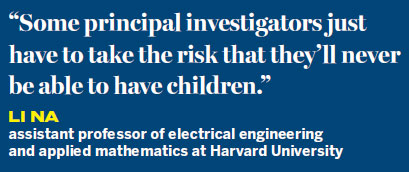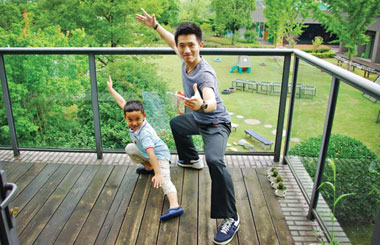Testing times
Updated: 2016-05-06 06:54
By Cheng Yingqi(China Daily Europe)
|
|||||||||
As China strives for gender equality, female scientists are still struggling to overcome social and cultural blocks
Take a look around any college lecture hall or company boardroom in China today and you'll see far more women than you would have 25 years ago.
In the nation's laboratories, however, it's a different story.


Despite a growing number of Chinese women studying science disciplines at all academic levels, relatively few are actually going on to have careers in the field, let alone heading up major government-funded projects.
Insiders say female scientists are still hindered by social and cultural factors that women in other fields have largely been able to overcome, with the biggest hurdles undoubtedly related to starting a family.
A State Council white paper on gender equality in 2014 said women made up 52.1 percent of undergraduate students in China that year and 51.6 percent of postgraduate students. Yet for PhD candidates the proportion of women dropped to 36.9 percent.
This can in part be attributed to the fact that postgraduate degree holders don't start their career until their late 20s, which is about the time most Chinese women have their first child (the average age was 28 in the 2010 national census).
Postponing a family can cause complications. In China, it's widely held that a woman should have her first child under the age of 30. After that, single women, especially those with advanced degrees and higher incomes, can struggle to find partners.
So the timing poses an obvious dilemma - and not just for the female scientist.
Funding for scientific research is often time-sensitive, so losing a team member can be a major blow if it delays a project. Plus, in China, employers are responsible for covering maternity pay, not social insurance, and there may not be enough surplus funds to hire a temporary replacement.
"The Chinese government allows women to take six months of maternity leave, but I'm not sure this really helps women who want to have a career in science," says Li Peng, a professor of life sciences at Tsinghua University in Beijing.
She warns that the current conditions open the door to potential gender discrimination.
Related Stories
Female patrol team seen at West Lake in Hangzhou 2016-05-03 10:45
Half the Sky talks up the need for more female artists in public spaces 2016-05-03 08:10
Chinese female writer nominated for Hugo Award for Best Novel 2016-04-28 11:09
China to have first batch of female pilots for 'flying leopard' fighter bombers 2016-04-20 09:26
Female cops combine warmth with strictness 2016-04-04 09:53
Today's Top News
London's mayor an exception to Muslim ban -Trump
EU anti-dumping moves may damage ties with China
Search widens for leading overseas professionals
60% of career women say no to second child: report
Testing times
Big hopes as China hosts the G20
Inspectors to cover all of military
Britons embrace 'Super Thursday' elections
Hot Topics
Lunar probe , China growth forecasts, Emission rules get tougher, China seen through 'colored lens', International board,
Editor's Picks

|

|

|

|

|

|







